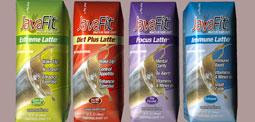Here is an article I found on
MediaPost connecting functional food and beverage products to weight loss. Dairy based beverage trends should bold well for the new
Javafit RTD launch!!!
 Functional Food, Beverage Products Present Opportunities
Functional Food, Beverage Products Present Opportunitiesby Karlene Lukovitz, Tuesday, Oct 28, 2008 6:38 PM ET
Diet products that are simply lower in fat, sugar and calories aren't as hot as they once were. "Functional" is the new frontier for food and beverage companies looking to grab the attention and dollars of the growing number of overweight consumers at home and abroad, confirms a new Euromonitor International Trend Watch report, "Opportunities Within Functional Weight Management Products.'
In response to consumer trends, weight-management products are undergoing a "profound shift" away from merely "better-for-you" (BFY) or "lesser evil" reduced fat/sugar offerings and toward products with ingredients promising benefits such as appetite suppression and increased metabolism/calorie burning, report Euromonitor's analysts.
In fact, whereas such ingredients and claims were once mainly the bailiwick of those diet supplements promoted on TV via startling before-and-after photos of women and men in bathing suits, mainstream companies are increasingly looking to get in on the action.
The reason: Worldwide BFY packaged foods sales reached $116 billion, and beverages reached $36 million last year, but together, their annual growth rate was only marginally higher than the 2% to 4% seen by the overall packaged F&B market, according to Euromonitor. Meanwhile, fortified/functional F&B's continued to see growth of about 10% in 2007.
A few major U.S.-based F&B's have already stuck their toes into the functional waters. Kellogg has been particularly active with its Special K brand, including its recent launches of Special K Sustain cereal with fiber and soy protein and its "innovative--especially for a cereal company"--Special K20 Protein Water mixes and bottled waters. Both products hone in on the "satiety" trend, points out Euromonitor.
The joint Coca-Cola/Nestle launch of Enviga in the U.S. in late 2006 stimulated controversy and lawsuits with its "negative calorie" claim. But that hasn't dissuaded PepsiCo from introducing, with a less aggressive marketing/claims approach, both Diet Pepsi Max (zero-calorie cola with ginseng and extra caffeine to provide "a kick of energy") and Tava--another zero-calorie, carbonated beverage fortified with vitamins and chromium and offered in three "exotic flavor blends."
Smaller and medium-sized functional weight-management players in the U.S. include Marquis Platinum's new Vitality Drink with green-tea extracts, marketed as an energy drink with a calorie-burning formulation; and Scientific Response's dairy-based Drink & Shrink chocolate shake, which contains hoodia gordonii extract. The latter, reports Euromonitor, is sold as a dietary supplement rather than a food product "in order to get around much stricter regulations on herbal extracts permitted in foods, as set out by the U.S. Food and Drug Administration (FDA), which would not allow hoodia as a functional ingredient in food products."
Unilever is reported to be planning the launch of a hoodia weight-management product under its Slim-Fast brand by 2011, according to Euromonitor.
Functional weight-management F&B products are already quite prevalent in other countries, including Spain and Japan.
Euromonitor explains that functional weight-management products fall under three broad categories/benefits claims: products that suppress appetite/induce a feeling of satiety and include functional ingredients such as chromium, hoodia gordonii, fat emulsions, added protein and fiber; products that boost metabolism and include ingredients such as conjugated linoleic acid (CLA), omega-3 and green-tea extracts; and products that inhibit digestion of macronutrients (carbs, fats) or their conversion into body fat with elements such as hydroxycitric acid (HCA).
Here's a summary of the most promising areas of opportunity for F&B's in the functional weight-management arena, per Euromonitor's analysis:
* Dairy: Dairy products provide the "ideal" physical and marketing medium for the addition of many types of functional ingredients, in part due to the global probiotic yogurt boom. "Consumers the world over are more than ready for the next line of functional dairy products," says Euromonitor, noting that, for example, one-shot yogurt drinks "lend themselves especially well to employing a satiety-enhancing positioning." Such products are already available in other countries.
* Beverages: In addition to the carbonated and other drinks already noted, waters are ripe for functional marketing because of "the bottled water industry's well-communicated rehydration message" and because bottled waters in general are already associated with weight management in consumers' minds, reports Euromonitor. Again, waters with weight-management-purporting benefits are available in other countries.
* Bakery: Since the reduced- or low-carb craze began to wane in 2004, marketers have largely failed to capitalize on the "golden opportunity" in weight-management-positioned carb products, says Euromonitor. "Weight-management products ideally need to have a daily presence in consumers' lives if they are to stand any chance of being effective"; hence, the opportunity in products like bread or breakfast cereals, say the analysts.
Aside from Kellogg in the U.S., Japanese manufacturers have introduced soluble-fiber cake bars that produce a long-lasting feeling of satiety, Euromonitor reports. But chromium, "which is promoted in the dietary supplements realm as fighting off sugar cravings, would make an ideal weight management ingredient to be added to staple bakery products," and HCA, "which is purported to inhibit the conversion of carbohydrates into fat, offer "great potential" for carb-rich, low-fat bread and breakfast cereals, it points out.

